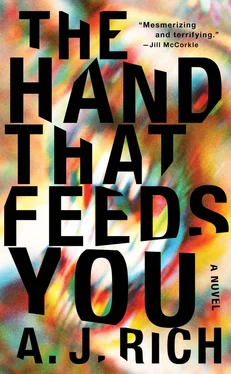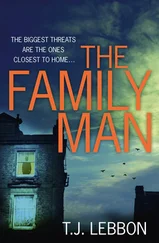A knitting needle jabbed my left hand. I screamed so loudly that the dogs began barking again, only two now.
“We’re going to give you something to help you relax so we can check you for wounds.”
A black heat began to creep up my arm, as if someone had put a warm glove on my hand. Then the blackness expanded until it was big enough for me to climb in, a merciful black bag in which to disappear.
“We need to ask her some questions. Can she talk?” asked one of the policemen.
“She’s in shock.”
“Is your name Morgan Prager?”
I tried to nod, but the black bag was too tight.
“Can you tell us who was in the apartment with you? We can’t find any identification on the deceased.”
“Can she hear us?” the other officer asked.
I was lifted onto a gurney and rolled through my apartment. I opened my eyes as we passed the bedroom. Now the scene confused rather than terrified me. “What happened?” I asked in my new, small voice.
“Don’t look,” said the female.
But I did look. No one was attending to Bennett. “Is he suffering?” I heard myself ask.
“No, honey, he’s not suffering.”
Just before I was carried downstairs, I saw Chester’s body on the foyer floor. Why did they shoot him? Cloud and George were each in an Animal Control crate labeled DANGEROUS DOG.
• • •
The doctors found no wounds on me, nothing physical to explain my rigid immobility, my muteness, except for the occasional scream when anyone came near me. For my own safety, they issued an NY-code section 9.27: Involuntary admission on medical certification.
True or false:
 You have experienced or witnessed a life-threatening event that caused intense fear, helplessness, or horror.
You have experienced or witnessed a life-threatening event that caused intense fear, helplessness, or horror.
 You reexperience the event in dreams.
You reexperience the event in dreams.
 You relive the event while awake.
You relive the event while awake.
 You have thoughts of killing yourself.
You have thoughts of killing yourself.
 You have thoughts of killing others.
You have thoughts of killing others.
 You understand you are in a psychiatric hospital.
You understand you are in a psychiatric hospital.
 You know why you are here.
You know why you are here.
 You feel responsible for the event.
You feel responsible for the event.
I knew this well-meaning psychiatrist, who introduced herself as Cilla, was asking the time-honored questions necessary to evaluate my state of mind, but the questions I needed answered were not among them.
She was watching me with serene curiosity. “You don’t have to talk to me right now, or answer these questions.” She opened her desk drawer, slid the test back in, and took out some Nicorette gum. “I’m as addicted to this as I was to cigarettes.” She looked to be in her early fifties with unfussy hair kept off her face with a tortoiseshell barrette. She poured herself a cup of coffee and reached for a second cup from atop the credenza. “What do you take in yours?” She took a carton of milk from the minifridge and started pouring. “Say when.”
I held my hand up.
“Sugar?”
“Is what I remember true?” These were the first words I’d spoken in six days.
“What is it you remember?”
“My fiancé is dead. I found him in the bedroom. He’d been attacked by my dogs.”
The psychiatrist waited for me to go on.
“I knew he was dead before I called the ambulance. I hid in the bathtub until help came. A cop shot one of my dogs.” I couldn’t meet her eyes. “It’s my fault.”
“You were in shock when you were brought in, but your memory was not impaired. Were you able to sleep last night? Are you eating?”
I said no to both questions. I would say no to any question about normalcy. I would never experience “normal” again. How could I unsee what I’d seen? What else was there to see?
“I understand that your pain is immeasurable, and I can give you something to sleep right now, but I cannot medicate against grief. Mourning is not an illness.”
“Can you give me something for guilt?”
“You might feel guilty because guilt is more endurable than grief.”
“What do I do?”
“You’re doing it. You’re talking to me. That’s the first thing you can do.”
“Talking won’t change the facts.”
“You’re right, but we’re not here to change the facts.”
“He’s dead. I want to know what happened to my dogs.”
“The dogs are evidence. They’re being held by the Department of Health.”
“Are they going to be killed?”
“What do you think should happen to them?”
Cloud never hurt anyone. I had had her since she was eight weeks old. What could have set off the pit bulls? They had slept in my bed for two months. They even slept in the bed when Bennett visited. Though the first couple of times I had to remove Chester for resources guarding — I was the resource he was guarding. But maybe Bennett had physically threatened him? The attack on him was full-out. Bennett was unidentifiable.
“I want to know what happened to Bennett’s body. Have his parents arranged a funeral?”
“The police still haven’t been able to locate them.”
“He said his parents live in a small village in Quebec.”
“Was Bennett visiting from Quebec?”
“He lived in Montreal.”
“Your brother told me he had never met Bennett.”
“You talked to Steven?”
“Doesn’t Steven live near you?” Cilla asked.
“We had so little time together, Bennett only wanted to see me.”
“Did you ever visit him in Montreal?”
“He wanted me to, he gave me a key, but it just ended up being easier for him to come here.”
“How did you meet?”
“I was doing research for my thesis in forensic psychology.”
After six days of not speaking a word during our daily sessions, I still wasn’t ready to tell her that I had met him while testing a theory about female victims of sexual predators online. I’d come up with five profiles for women who were at particular risk: the Pleaser, the Rebound, the Damaged, the Sitting Duck, and the Accommodator. I posted them on various dating sites. I also created a control persona — a shy, earnest, workaholic do-gooder, who could laugh at herself and liked sex — in other words: me. Bennett’s first e-mail put him in the men’s control group of regular guys. Unlike the other “regular guys,” whose responses were more like résumés sent to a headhunter for a six-figure job, Bennett was curious about me — what books I read, what music I listened to, where I was most myself. I felt fraudulent until, our exchanges escalating, I had no choice. But when I told him what I was really doing online, instead of being angry or hurt, he was fascinated. He asked me countless questions about my work, and I was flattered by his interest, more than flattered.
His interest in my work opened up another arena in which our minds met. His enthusiasm for my ideas surpassed that of my classmates, including the hot Dominican cop I dated for a while. If anything, Bennett’s interest turned a little obsessive. One afternoon I found him reading a response to my Hotmail account, the one I’d set up for my study. The author was someone I deemed a sexual deviant, though I wasn’t yet sure if he was a predator. When I asked Bennett what he was doing, he said, “You left it open, I was curious. I notice this guy always refers to himself in the third person. Is that characteristic?” I hadn’t even realized this respondent did that; not only did that realization scotch my discomfort with Bennett’s presumptuous behavior, it underscored the quality of his attention when it came to my research. Once again he had helped me. And this thought occurred to me: I could neither apologize nor thank him. Despair owned me again.
Читать дальше

 You have experienced or witnessed a life-threatening event that caused intense fear, helplessness, or horror.
You have experienced or witnessed a life-threatening event that caused intense fear, helplessness, or horror.![Корнелл Вулрич - Eyes That Watch You [= The Case of the Talking Eyes]](/books/32103/kornell-vulrich-eyes-that-watch-you-the-case-of-thumb.webp)









